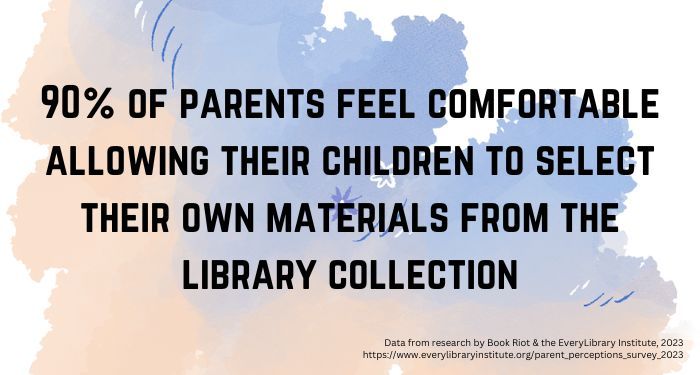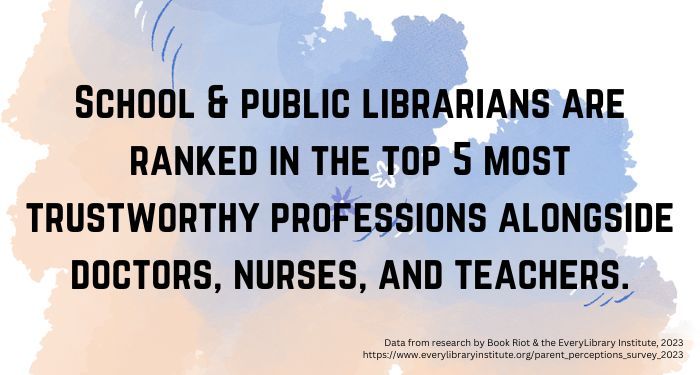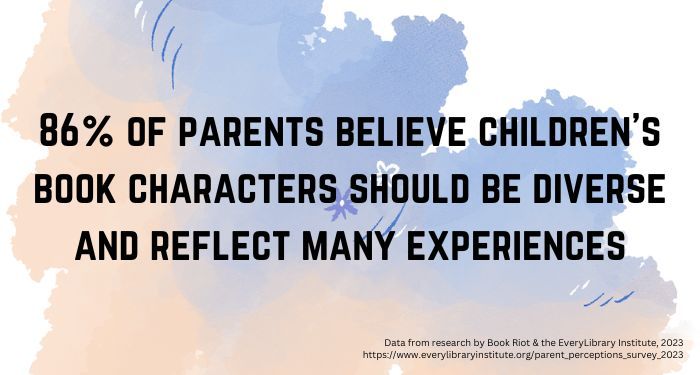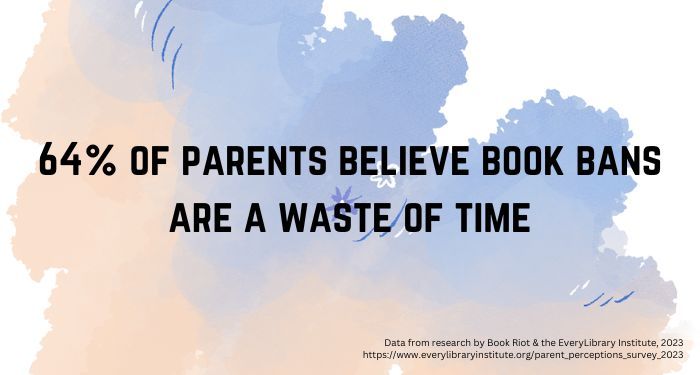This is the first in a series of posts that will offer insights and calls to action based on the results of three recent surveys conducted by Book Riot and the EveryLibrary Institute. The surveys explored parental perceptions of public libraries, parental perceptions of librarians, and parental perceptions of school libraries.
We know the results of these surveys are a study in tension. Where parents agreed with big picture ideas — across all three surveys, 94% said they feel their child is safe at the library — it was some of the more granular topics where we saw conflicting responses. It is important to talk about those, including the fact that there are parents who believe library workers should be prosecuted for the materials they offer in the collection and that many believe there needs to be more barriers to material access in place for their children. But rather than focus on those as threats, perhaps they’re better framed as opportunities. These areas of contention are places where librarians, who are overwhelmingly perceived as trustworthy and worthy of respect, can harness those perceptions to combat mis-, dis-, and malinformation about what they do.
Let’s take heart here. The vast majority of parents believe the following things about libraries and library workers:
- 95% of parents believe every school should have a school librarian
- 93% of parents believe their child is safe using a school library
- 90% of parents feel comfortable allowing their children to select their own materials from the library collection
- 85% of parents are satisfied with the work librarians do
- 85% agree that librarians support children’s learning
- 80% of parents report trusting school librarians to select appropriate books and materials for the school library; in the survey on parental perceptions of librarians, this number was 92%.
- 83% agree that librarians know what books children would love
- 82% of parents trust school librarians to recommend age and content-appropriate books and materials to students.

More:
- 78% agree that librarians are true advocates for lifelong learning
- 78% of parents either allow their children to use their library card or state that their child has their own library card
- 77% agree that librarians make the library a place for fun and creativity; the same percentage believe librarians are friendly and approachable
- Between 76% and 92% of parents visited a library within the previous year, and between 84% and 86% had a library card
- 74% agree or somewhat agree that book bans infringe on their right as a parent to make decisions for their children
- 69% of parents consider library workers relatable people in their communities
- School *and* public librarians are ranked in the top 5 most trustworthy professions, alongside doctors, nurses, and teachers.

When it comes to the materials available in the library:
- 89% of parents believe that books should be diverse and reflect multiple communities (57% agree and 32% somewhat agree)
- Further, 86% of parents believe children’s book characters should be diverse and reflect many experiences
- 87% believe that teenagers should have access to a wide range of books in their school library, including on complex and controversial subjects and themes
- 66-86% of parents have not felt uncomfortable with something their child has borrowed from the library
- 67-87% of parents reported that their child has not been uncomfortable with something they have borrowed
- 67% agree or somewhat agree that books about complex topics like race or sex belong in the library
- 57% say that reading opens children up to new ideas, new people, and new perspectives

On the topic of “parental rights”:
- Between 70% and 90% of parents agree that they are responsible for what their child reads
- Between 61% and 74% agree or somewhat agree that book bans infringe on their right to make decisions for their children
- 64% of parents believe book bans are a waste of time
- 60% believe that children have the right as students to decide their own reading materials
- 58% do not believe that banning books is an appropriate way to prevent children from learning about certain topics
- Between 56% and 70% of parents see book banning as an important issue they consider when they vote
- 54% believe book banning harms children

Identifying Opportunities in the Library
Taking heart with this data is important. In a time when library workers are beleaguered by rhetoric from the far-right and are the most likely to be handling book banning issues, it is important to remember the vast majority of parents trust and respect librarians. Where tensions or conflicting ideas emerge is where there is opportunity to educate and challenge mis- and disinformation about the roles and responsibilities of librarians and libraries.
Note that you might need to adapt or modify these ideas based on the laws and policies in your own jurisdiction.
Educate People About How Materials Are Selected For The Library
Many library workers already do this, but it bears emphasis. If most parents do not know how librarians select materials for the collection (81% of parents in the school library survey and 53% in the public libraries survey), then offer them an answer. Create a one-sheet or short video explaining the process, including the sort of review sources used in making decisions and why those review sources are used. If you’re in a school, explain that materials in the collection both serve the curriculum and meet the recreational needs of student readers. This means meeting the needs of all students in a building, from the youngest to the most senior. Demystify the process and put this information in readily accessible places. Your website is great, and if you are in a school where you can get printed materials into a take-home folder, use that to your advantage. Talk with your boards, too — it is possible that board members do not know how the process of selecting library materials works, either, especially if they are new to their role. Offer to give a short presentation at one of the meetings; this will be especially useful for the historical record, as it will be included in meeting minutes and any video repository if recorded.
This also helps inform patrons about why librarians are the most qualified to make collection selections. While librarians ranked as most qualified to choose materials both in public and in school libraries (rating a 3.6 on a 5-point scale, with 5 being most qualified), a small percentage also believed that librarians should be prosecuted for the materials available (25% in public libraries and 16% in school libraries) — even if they do not know how those materials are selected.
Parents might still say they do not know how librarians select materials for the collection, but you’ve done your work. Putting this information out there is transparency and further bolsters your perception as trustworthy. You aren’t, nor have you ever, tried to hide what you’re doing because there is nothing TO hide.
Put Yourself Out There
Chances are that you already do, but where and how can you make your presence more visible? This goes more for the school librarians than the public, but it is valuable for both. Only 41% of parents state they have met their school librarian. Where and how can you reach another 41%?
How To Use The Catalog
This feels like library 101, but if there’s anything that several years of book banning have shown, it’s that parents do not know there is a list of every book available in the library — a frequent call from uninformed “parental rights” activists (the survey findings are that 67% of parents believe this should exist). It’s the library catalog. While you might spend time teaching students how to use it, do you have a handy guide on your website for parents? What might be basic knowledge to you, though, is not to those who are being led by false narratives. Put a guide to using the catalog in an easy-to-find place, and if nothing else, you’ll have given yourself a point or two for transparency.
Update Your Collection Policies & Make Them Easy to Access
The ideal time to update your collection development and management policies was when challenges to books began to rise. The second best time is now, especially given that book banners are taking advantage of bad policies to get hundreds of titles removed at a time. Make these policies robust, explaining the kinds of materials you collect; if you have the opportunity, include information as to why you collect diverse materials, too. The data might not change the minds of those who are committed to a white, cishet christofascist agenda, but it might be eye-opening to others. For example, when you note in your policy that your collection is inclusive of a range of gender and sexual identities, include the statistic that one-quarter of US teens openly identify as LGBTQ+, per the CDC. More, PEW Research notes that only slightly more than half of today’s teenagers are non-Hispanic white. One in four of today’s teens in the US are Hispanic, 14% are Black, 6% are Asian, and 5% are bi- or multi-racial. Nearly 1/4 of Generation Z are the children of immigrants, and 66% live in households with married parents. This information should not be necessary to state your library’s commitment to inclusion, but it offers information to further support the decisions made by staff.
Use the language being used right now in your collection policies: note that parents always have the right to determine what their children access. If you have opt-out policies for your library, include or link to those; if you don’t, emphasize that parents are responsible for having these conversations with their children. They say so themselves! Mention in your policies that you do not remove the right of all children to access materials based on the beliefs of a few. Instead, it is up to parents to set those limits for their own children.
Data show that 43% of parents report knowing their library has a collection development policy, and the same percentage report knowing how to locate it. A slightly higher percentage, 56%, know how to file a complaint about a book they believe to be inappropriate. Once you have updated your policy and created a robust form for book challenges, make it easy to find. You might not like having your challenge policy readily available, but the more you make it findable, not only are you more transparent, but you build trust, too, through being open so that patrons can voice their feelings about the collection. This right to petition goes hand-in-hand with the right to read, and libraries, as upholders of the First Amendment rights of all, should not shy away from it.
You Are Trusted More Than You’re Not
Book banners are loud, well-funded, and connected to those perceived to have a lot of power. That is real, and at times, it is unrelenting.
But it’s also true that those voices are the minority. You have the majority behind you and your work.
Book Censorship News: January 5, 2024
With the holidays and school breaks, this list is shorter than usual.
- Perks of Being a Wallflower by Stephen Chbosky, Sarah J. Maas’s Kingdom of Ash and Empire of Storms, Tilt by Ellen Hopkins, Infinite Moment of Us by Lauren Myracle, and Rethinking Normal by Katie Rain Hill were all challenged in New Prairie United School Corp. (IN). Five of the six will stay where they were in the district middle school; the Myracle title was moved to the high school.
- Seaside Public Library (OR) will NOT be removing And Tango Makes Three nor When Aiden Became a Brother.
- Whenever you read a story weirdly trying to justify book bans with “well, the books don’t get checked out anyway,” remember there’s likely a reason why the books aren’t checked out. The kids are reading them in the library.
- “If the new bill filed in Tennessee’s House passes, it would allow parents to sue if they disagree with a school board’s decision on a book.” Good grief. Just do your job, parents, and parent your students.
- The Sun Sentinel editorial board on the exaggerated response to the book ban bills in Orlando, Florida, schools (paywalled).
- The Escambia School District lawsuit hearings begin next week, and the state attorney general will be allowed to testify, claiming that the book bans are allowed because the decision to remove the books was “government speech” and not in violation of the First Amendment.
- Is Alabama’s pro-book banning legislature surprised that the book snitch line has mostly been used in defense of keeping books on shelves? Because they seem to be.
- “Additionally, the LEARNS Act prohibits “indoctrination” of children in schools but does not define the term. Those who oppose “indoctrination” in libraries and classrooms often cite LGBTQ+ topics and systemic racism as the information they do not want children to have. As a result, some school libraries and districts have become “very strict about how books are chosen and how books are ordered.” This is in Arkansas.
- How conservatives have rammed right-wing propaganda from PragerU into public schools.
- Cape Girardeau Public Library (MO) has been dealing with nonsense from book banners about pornography in their collection. They have issued another statement asserting their collection is in compliance with state laws. I thought these people said they didn’t care about what was in public libraries?
- Queer Louisianans are fighting book bans–and winning.
- Hutchinson School Board (MN) is going to make banning books in the district easier. This line from a random citizen in the district is really worth sitting with, as it truly emphasizes the lack of understanding of what a media specialist (aka librarian) does: “’The decision of appropriateness is left entirely to the viewpoint of that media specialist,’ she said. ‘There’s no objective guidance for specialists to decide what materials to include.’”
- The team which has filed a lawsuit against the removal of 56 books in Mat-Su schools (AK), has just filed for an injunction that would put the books back on shelf before the trial. More details to come.
Also In This Story Stream
-
Partial Victory in Iowa Book Ban Lawsuit: Book Censorship News, December 29, 2023 -
Highlights and Lowlights from 2023 in Book Banning News: Book Censorship News, December 22, 2023 -
When Do Parents Trust Their Children With Materials at the Library?: Book Censorship News, December 15, 2023 -
Manufacturing Problems with School and Library Books to Cash in on Solutions: Book Censorship News, December 8, 2023 -
Most Parents Trust, Respect, and Feel Safe with Librarians: Book Censorship News, December 1, 2023 -
Book Censorship News: November 24, 2023 -
Where Are The Book Sanctuaries?: Book Censorship News: November 17, 2023 -
My Book Was Banned Again — This Time In Retaliation for My Anti-Censorship Work: Book Censorship News, November 10, 2023 -
Most People Don’t Know How Librarians Select Collection Materials, So What Do They Think of Book Bans?: Book Censorship News, November 3, 2023

